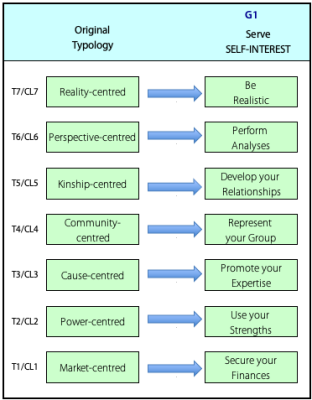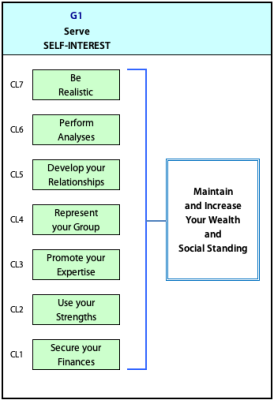Serve Self-interest: G1
Means & Ends

The ends are to and to to increase your wealth and social standing to whatever level you deem to be appropriate and desirable.
No one else will do this for you. More seriously, others are also trying to increase their own wealth and standing possibly at your expense, and will often be in competition with you.
The means must derive from explicitly and deliberately striving to benefit yourself. That directs us immediately to the 7 , all of which can and should be useful for you. See diagram at right:
The research requirement here is to identify a key principle derived from each approach to characterize each monad that:
- provides an obvious personal benefit in a competitive world;
- is potentially useful for everyone regardless of their preferred approach;
- provides a foundation for combination with adjacent principles.
This foundational focus on is about , and its function appears to be gain advantage over others. This may be by increasing your strength (which includes but is not limited to finance) or reducing your vulnerability.
Self-assertion here is very basic: just affirming your wish, intention, interest or position: affirmation means speaking up and putting yourself out there.
The monadic qualifier is proposed as «competitively», which fits because it is associated with .
The 7 Monadic Groups
G11: Secure your Finances
Function: To provide for your necessities.
Money serves your self-interest and is the only approach that provides this focus. There is no doubt that having enough money is essential for looking after yourself, and that people compete whenever money is made available: be it a job, a prize, or a handout.
The phrase leaves open how the money is obtained, how much is "enough", and what to do when you have obtained funds.
G12: Use your Strengths
Function: To overcome resistances and setbacks.

Many of the principles seem ethically problematic. However, there is always a power system and you have to handle it one way or another. Competition is intrinsic to this paradigm because people jockey for a place in the pecking order.
In order to survive and limit your suffering at the hands of others, you must knowing full well that others are likely to be using theirs. You likely possess a diverse variety of strengths, with everyone being different.
G13: Promote your Expertise
Function: To get socially valued for your services.
Focused energy and passion can be harnessed to specialised work in which you have become expert. To maximize benefits, you need to look for opportunities to , which need not be limited to your paid work or be confined to just one area.
There will always be others with whom you will be in competition, which means the high standards and passion for excellence characteristic of the cause mentality and a determinant of your social standing become particularly important.
G14: Represent your Group
Function: To benefit from group strength and member support.
Forming a group or joining existing groups is essential given that sole individuals are vulnerable and, from a political perspective, barely exist in society. All groups confer power and must be viewed as a potential resource. . Affirming your group membership will often serve your interests.
The phrase confirms that every member of a group is representative of that group. There will always be people representing other groups and even within your group others will present the group slightly differently, so competition is a given. If you seek status, there will be competition for formal representative positions, whether paid or unpaid.
G15: Develop your Relationships
Function: To ensure a willing service that is more than money can buy.

emphasizes the value of emotional relationships on which you can depend, and where each adapts to the other's wishes and feelings. Bonding delivers practical benefits, especially in bad times, but requires mutuality and emotional effort. Relating, as distinct from merely interacting or transacting, injects a willingness to adapt to you and is mandatory for intimacy and family life, helpful for work and business, and deepens friendships.
Everyone experiences competing pulls for their attention and care, and competes with others in securing a counter-party's emotional time and energy.
G16: Perform Analyses
Function: To clarify choices and their likely consequences.
promotes dispassionate analyses from multiple perspectives. In looking out for yourself, you have to know what is going on and that means you will benefit from from your own perspective.
Your analysis will inevitably be competing with analyses by others who apply different emphases or even have a completely different perspective. Diverse analyses generate diverse and often conflicting conclusions and recommendations as to what constitutes your self-interest.
G17: Be Realistic
Function: To focus on what counts for you.
While identifying with is unnatural and undesirable for most, the intrinsic value of in looking out for yourself is easily accepted by all.
The issue here is that people invariably differ as to what the reality is and press intensely and urgently for their perception to count. As a result, in a social situation where your interests are at stake is a competitive process.
Transition
In practice, is about being opportunistic. It involves taking advantage of situations where you see it makes sense and where others will regard your activities as appropriate and acceptable.
But you need to look beyond the present moment to establish yourself. The environment is dynamic and the future is uncertain. You need to find ways to get a footing in social life so that the ebb and flow of events are not disruptive.
Because life does not offer guarantees, it is necessary to .
is made possible by forming dyads using two adjacent .
- Continue with risk-taking-G2 Dyads.
- Go to the review to see the full picture.
Originally posted: 10-July-2025.
